 |
|
  11.24.02 11.24.02
click to enlarge


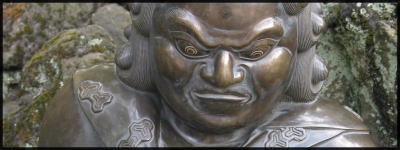

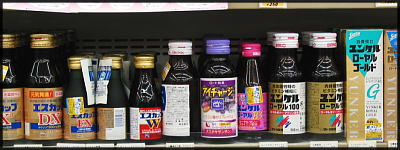
It's very late here in Tokyo: 1:30
a.m.
I've just finished posting today's pictures
but I don't think that I have enough mental
energy left to write anything decent, so
I'm going to put that off until tomorrow.
I'll add an update above this text, so if
you're just visiting now, check back soon.
I've gotten a lot of feedback in the comments
section about my last post on racism in Japan,
so I'll probably respond to some of those
points tomorrow.
Until later...
  11.21.02 11.21.02
click to enlarge

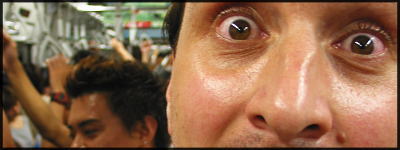



You've often heard me comment that my favourite
thing about Japan is how safe it is: The
value of living a fear-free life can't be
overstated. One thing that I haven't talked
about on Hunkabutta yet, however, is racism
in Japan, something that the Japanese are
kind of infamous for.
I don't want to get into a full-blown discussion
of Japanese racism, I just don't have the
energy for such a 'walking-on-eggshells'
kind of topic right now. Let's suffice it
to say that my basic impression is that the
Japanese are just as racist (no more, no
less) as every other group of people in the
world. However, like so many other things
in Japan, the racism here comes with its
own peculiar quirks.
Before I explain what I mean by 'quirky'
Japanese racism, let me qualify my own personal
definition of racism. To me, 'racism' is
a habit of generalization. It's a way of
thinking vaguely about individuals in terms
that you ascribe to their racial/ethnic/cultural
group. This is not always a negative thing,
and in many cases is unavoidable. So, from
this point of view, the statement "Swedish
people are beautiful," is equally as
racist as the statement "Finnish people
are assholes". Saying "I love Chinese
people" is equally as racist as saying
"I hate Chinese people." Both are
racial generalizations (the definition of
'race' is a whole other topic).
What most people call 'racism', i.e., hateful
and hurtful discrimination based on race,
I would call 'bigotry'.
Now, lets return to the topic of Japanese
racism. One of the quirky things about racism
here is that Japanese people (although they
are generally incredibly tactful) often have
no qualms about making strikingly 'racist'
statements that in most countries would be
considered totally taboo. I think that they
subscribe to my definition of racism, but
unlike most people, the Japanese aren't afraid
to talk about 'bad' racial generalizations,
where we in the West will only make 'good'
racial generalizations. I suppose they feel
that logically they are both the same, so
why pretend otherwise?
This habit of being unapologetically racist
is probably a result of the fact that Japan
is so racially homogeneous and has been for
such a long time. They don't have the racial
tensions and history of domestic bigotry
that other countries have (of course there
was the WWII Nazi-esque 'superior race' platform,
and there still is the indigenous Korean
issue).
The habit of speaking openly about personal
racial feelings is especially striking when
you see it in the press. Japanese politicians
and public figures have an amazing capacity
to say the stupidest things publicly. One
incident that comes to mind happened a while
back during qualification trials for the
last Olympics. There was some sort of track
and field event here and the Japanese team
lost to a team from an African country. At
the press conference someone asked the Japanese
Olympic delegate about the loss, and he said,
"The only thing worse than losing is
losing to Blacks." I don't know what
the guy was thinking, it offended a lot of
people, but in the end nothing came of it.
What inspired this little essay on racism
in the context of a super-safe society was
an article that I read in the Japan Times yesterday: "Crimes set record high,
arrests record low in '01." It's a report
on the contents of a white paper released
by the Japanese government recently. The
interesting thing about it is that there
are some classic racist statements written
right in to the document and they are, as
usual, presented in a matter-of-fact, unapologetic
way. Here are two examples:
| Last year saw a record 2.74 million Penal
Code violations, excluding traffic offenses,
up 12 percent from 2000, but the arrest rate
fell to a postwar low of 19.8 percent, the
government reported Tuesday, adding that although foreigners committed
a small percentage of the crimes, their offenses
were models for Japanese offenders. |
and similarly...
| The report notes that more Japanese are turning
to crime, but also reiterates concerns about
crimes such as robbery and murder committed
by foreigners. While accounting for only a small percentage
of all crimes, offenses by foreigners, including
lock-picking and robbery, serve as a "model"
for Japanese criminals, according to the report. |
The point is not whether this 'foreign criminal
as model' theory is correct or not, it's
that the government doesn't seem to see anything
wrong about publishing, even emphasizing,
such a racially-loaded interpretation of
statistics. Personally, I kind of like the
openness of it. I mean, if that's really
what you think, then just come right out
and say it.
There are other strange things about Japanese
racism such as preoccupation with blood types,
self-directed racism, and racial infatuations,
but these will have to be saved for another
day.
Let me reiterate what I said earlier: Japanese
people are no more racist then anyone else.
Personally, I prefer Japanese racism to Canadian
racism because in general it is not so hateful.
Canadian racism is hidden away. You'll find
it in some basement rec room when a father
and son are watching the hockey game together
and the father says, "All them goddamn
Hindus are stealing our jobs. Why don't they
go back to India where they belong?"
Japanese racism is out there for everyone
to see. You'll find it in the newspaper when
the government announces to the general public
that the recent rise in serious crimes is
"due to the negative influence of foreigner
criminals on Japanese criminals."
Japanese racism is not quite so ashamed of
itself, and candor and honesty about your
feelings towards others, positive or negative,
is, I think, a good thing.
  11.18.02 11.18.02
click to enlarge
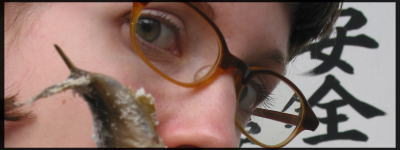
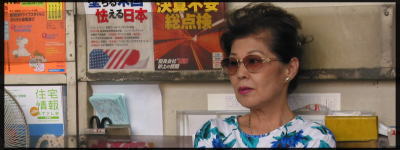


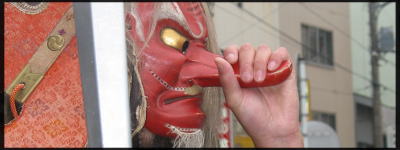
I read a story in the Japan Times today about a sokaiya scandal at a large investment house and
I thought that some of you may be interested
in this peculiar Japanese form of organized
crime.
Essentially, a sokaiya is a corporate extortionist. They threaten
to disrupt shareholder meetings. They are
paid off by corporate executives so that
they don't cause problems at these meetings.
Sokaiya will also look for scandals to expose by
investigating the personal lives of executives.
They will buy one or two shares of a company
which entitles them to attend the shareholder
meetings. Then they will either threaten
to expose the management's secrets or else
they will cause a general disturbance. If
they cause a disturbance, then the other
stockholders will know that the company is
involved with organized crime and consequently
the value of the company's stock will decrease.
Apparently, sokaiya were a major scourge to Japanese business
in the past, but strict measures were adopted
in 1982 to counteract the trend. The most
interesting thing about the anti-sokaiya
law is that both the extortionists and the
executives who pay them are charged with
the crime.
--------------------------------
UPDATE: Thanks to David of lightningfield.com for mentioning Hunkabutta in his recent
article on photologs published by Slate.com.
  11.15.02 11.15.02
click to enlarge
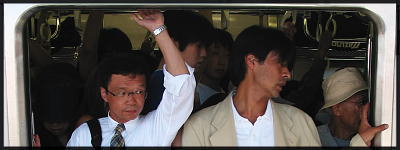


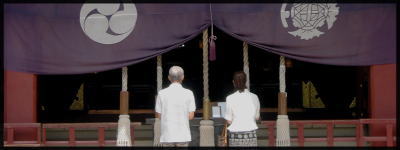

You may have heard that the Japanese appreciate
small details. This is certainly true when
it comes to gift giving because the wrapping
is almost as important as the gift itself.
In Japan, packaging matters. Shops go out
of their way to give you excess packaging.
I suppose it seems cleaner, newer and nicer
to the customer. This can be terribly frustrating
if you happen to be an environmentally conscious
person who is opposed to excess packaging.
I'll give you an example. Let's say you go
to McDonalds and order a hamburger, fries
and a drink to go, here's how it would be
wrapped.
First of all, each individual food item,
obviously, has its own wrapper. Your hamburger
and french fries will be put into a paper
bag along with some napkins. The top of this
bag will be folded over three times and then
the corner will be bent to stop it from unravelling.
Next, your drink will be put into a cardboard
drink holder. Then the drink holder and drink,
along with your straw, will be placed in
another paper bag. This bag is also rolled
up and gets its corner bent. Finally, both
paper bags are placed inside a large plastic
bag, and you are finished.
Here's another example. Let's say you buy
a box of 10 condoms. Each condom, obviously,
will be in its own wrapper. For some reason,
inside the main box will be two smaller boxes,
each containing five condoms. The main box
is wrapped in cellophane. When you go to
pay for it, the pharmacist will put the box
of condoms into an opaque paper bag (so that
nobody can see what's in it), and then she
will put that paper bag into a plastic bag
with a handle so that it's easier to carry.
I love a well-wrapped present, but sometimes
I could do without all of the plastic packaging.
Do you know what I mean?
|
|
|
 |


5 comments so far